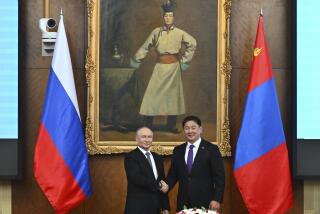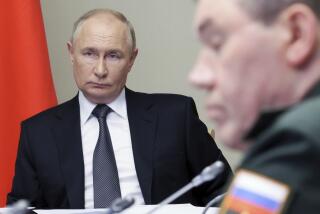New Cards Are Dealt in Asia
- Share via
The Chinese government announced over the weekend that it had signed its first consular agreement with Mongolia, the pro-Soviet buffer state that lies along part of China’s northern border with the Soviet Union. Outside experts suspect that it is no coincidence that the agreement comes only two weeks after a major policy speech by Soviet leader Mikhail S. Gorbachev.
In that speech, delivered in Vladivostok, Gorbachev announced that about 7,000 of the 118,000 Soviet troops in Afghanistan would be withdrawn--an offer that was first seen as a gesture toward the West. In fact, though, the talk was aimed mostly at Asians--especially the Chinese.
The Kremlin leader said that he was seriously considering the withdrawal of a “substantial part” of the Soviet forces in Mongolia, some of which are within striking distance of Peking. A few days later, another Soviet official said that Moscow was ready to consider concessions to China on the longstanding border dispute in Northeast Asia.
Relations between China and the Soviet Union have ranged from frosty to hostile for more than 25 years. The rift has been of enormous strategic consequence to the West because it led to the rapprochement between China and the United States and, eventually, to the evolution of a more moderate form of Marxism in China. It also added to the strains on the Soviet military budget.
Moscow’s efforts to patch things up have accelerated since Gorbachev took office. Aside from increased trade and scientific exchanges, however, not much has happened, because the Soviets have not dealt with the three central obstacles to better relations as seen from Peking: Soviet troop concentrations along the Chinese border, Soviet support for the Vietnamese occupation of Cambodia, and Soviet occupation of Afghanistan, which also borders on China.
In his Vladivostok speech Gorbachev addressed in detail only one area of Chinese concern: the intimidating Soviet military presence on the Sino-Soviet border.
The Chinese dismissed the token reduction of Soviet troops in Afghanistan as inadequate; what they want is a total withdrawal. And they cannot have liked the follow-up statement from a Soviet spokesman that the “socialist system”--by which he meant rule by pro-Soviet governments--is “irreversible” in Vietnam, Laos and Cambodia, on China’s southern perimeter.
However, the conciliatory tone of Gorbachev’s remarks is bound to interest Peking.
The Reagan Administration is watching all this with interest and probably some trepidation. After all, if the Soviet-Chinese split helped shift the global balance of power against the Soviet Union, a radical improvement in relations could have the reverse effect.
But while the Chinese will take whatever concessions they can get, they are unlikely to jeopardize China’s growing economic ties with the West--ties that are vital to the country’s modernization program--by returning to anything resembling an alliance with the Soviets.
Still, the Gorbachev speech is important. It reflects the skillful spokesmanship that Gorbachev has brought to the Kremlin. It is also a statement of determination to win international recognition of the Soviet Union’s role as a Pacific Basin power.
Just by making conciliatory gestures toward Peking, Gorbachev reminds President Reagan of the dangers of relying too heavily on the China card in U.S. dealings with Moscow. Intentionally or not, Gorbachev also gives the Chinese extra leverage with Washington on issues such as trade and U.S. military sales to Taiwan. The Administration’s best course, at this point, is to stay cool.
More to Read
Sign up for Essential California
The most important California stories and recommendations in your inbox every morning.
You may occasionally receive promotional content from the Los Angeles Times.













